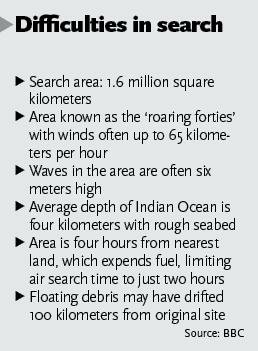Chinese experts demand more concrete evidence for 'ended' flight
By Sun Xiaobo Source:Global Times Published: 2014-3-26 1:33:01

Source: BBC
Malaysia's acting transport minister Hishammuddin Hussein provided more details on Tuesday about how the data from the missing Malaysian Airlines plane was analyzed to come to the conclusion that it "ended" in the Indian Ocean, which triggered more questions.
According to Hishammuddin, the British satellite telecommunications company Inmarsat used a wave phenomenon known as the Doppler effect to analyze the seven "pings" its satellite got from MH370.
An aircraft is able to communicate with ground stations via satellite. A ground station automatically transmits an hourly message referred to as a "ping" to the aircraft and gets a message returned from the aircraft, which is called a "handshake," according to a statement from the Malaysian authorities, citing information from the UK's Air Accidents Investigation Branch (AAIB).
The AAIB was involved in the analysis but it is cautious about further comments on the latest progress and an AAIB spokesperson told the Global Times, "We're not commenting further at this stage."
Preliminary analysis of the "pings" placed the plane's final position in one of two vast arcs, one heading north and the other south, stretching from the Caspian Sea to the southern Indian Ocean.
The Doppler effect states that the frequency of a wave weakens when an object goes away from the observer and gets stronger when heads closer.
"On this basis one can calculate the speed and travel direction of an aircraft," Jiao Weixin, a professor with the School of Earth and Space Sciences at Peking University, told the Global Times.
Malaysian Prime Minister Najib Razak had announced that the missing flight "ended" in the southern Indian Ocean west of Perth, a remote location far from any land, with no survivors.
Hishammuddin said that Inmarsat checked its predictions using information obtained from six other Boeing 777 aircraft flying on the same day in various directions. "There was good agreement," he said.
A Chinese expert, who requested anonymity, told the Global Times that the result is helpful for the ongoing search efforts, but analysis based purely on "pings" is not totally convincing and there should be data from no less than two satellites to decide the location.
Wide suspicions have been triggered as to why the Malaysian government came to the conclusion before any concrete evidence such as debris from the flight was found.
Zhuang Guotu, director of the Center of Southeast Asian Studies at Xiamen University, told the Global Times that if search efforts have no definite target area go on, the Malaysian government has to pay the massive costs.
Recent questions about Kuala Lumpur's ability to handle the crisis have been increasing, while emotional relatives of the passengers on the flight may cause more serious consequences and it may damage both Malaysia's international image and its ties with China.
"Given all these facts, the government may have decided to announce the result of the flight crash before any concrete evidence is found," Zhuang said.
Chinese Premier Li Keqiang on Tuesday urged Malaysia to provide detailed and accurate information about MH370.
The Malaysian side should strictly comply with international conventions, continue to coordinate the international search, and absorb Chinese experts to join the in-depth investigation, Li said.
Wild speculation about the reason for the deliberate diversion of MH370 even included suspicions over a political struggle.
A Malaysian government source told Reuters that Malaysia would lead the investigation, but hoped other countries would play a major role.
In the current circumstance, Malaysia is no longer suitable to lead the investigation, as it is technologically backward and far from the search area. In the meantime, the US, UK and particularly China, which has 154 citizens on the flight, should play a leading role in search efforts, Zhang Baoxin, an aviation and military expert with the China Aviation News, told the Global Times.
Sun Wei in London and agencies contributed to this story
Posted in: Society, Asia-Pacific